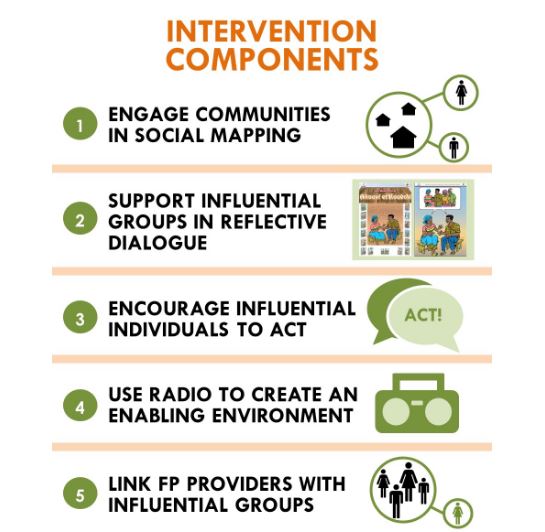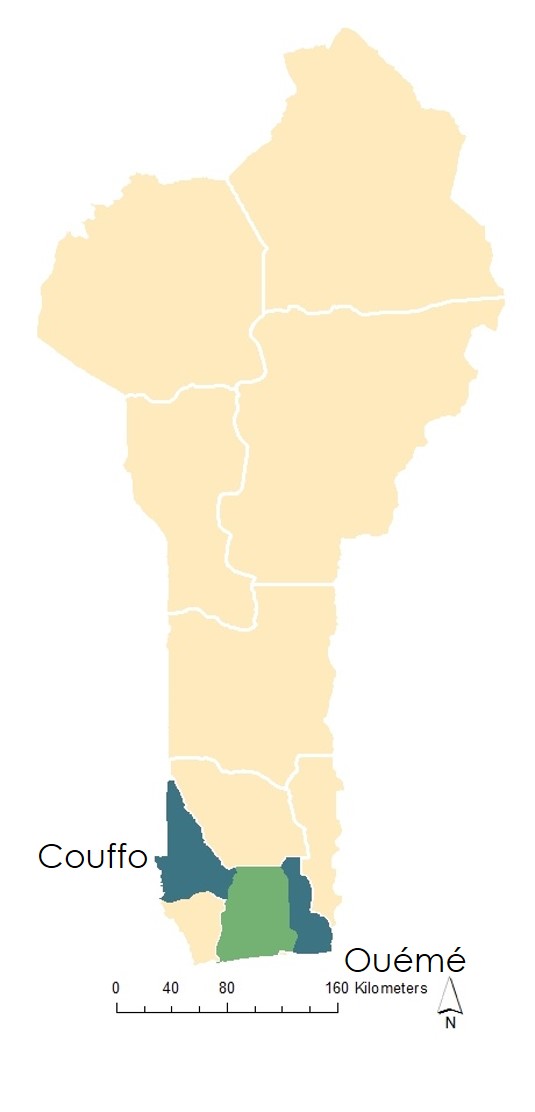Tékponon Jikuagou was developed as a response to persistent low rates of family planning uptake in Benin. Tékponon Jikuagou, which means “doing everything possible to prevent infant mortality” in the local language of Adja, aimed to reduce unmet need for family planning through social network interventions, thereby improving healthy timing and spacing of births .The six-year project (2010-2017) was developed by the Institute for Reproductive Health at Georgetown University and managed in collaboration with Plan International and CARE.
Timeline
Background
In many parts of West Africa, significant resources for family planning (FP) programs over several decades has improved knowledge and services. Yet in Benin, unmet need – the number of women and men who do not want a pregnancy but who are sexually active and not using an effective means of contraception—remains high, and sustained FP use remains elusive. In Benin the majority of sexually active women and men know of at least one modern method of FP, yet unmet need increased from 28 percent in 1996 to 33 percent when the project began in 2012 (DHS, 2011-2012). Contraceptive prevalence rose only from 3 percent to 8 percent over the same period. Evidently, an influx of programming does not necessarily translate into reducing unmet need or adoption and sustained use of FP.
Far less attention has been paid to other important social influences on women’s health, such as family members (mothers-in-law, for example), friends, and community leaders. The literature further underscores the necessity of acknowledging social networks and cultural contexts when addressing unmet need, in particular gender norms and power relations as influencers of reproductive health behavior.
The dual aims of Tékponon Jikouagou were:
|
Social network theory hypothesizes that once members in a social group begin to talk about and adopt FP methods and develop good experiences using such methods, the social networks containing these group members can accelerate diffusion by providing opportunities for social comparison, support and influence—not only for adopting a method but also for continuing or switching to another method.
Working with and through existing networks can improve efforts to mobilize communities around FP, and can more effectively support changes in attitudes, beliefs, desires, intentions and behaviors surrounding FP. For many people, the decision to initiate FP or continue use is not made during a single counseling session, nor is it a once-and-for-all commitment. Women and men may discontinue FP or switch among methods repeatedly even during a single year. The presence of a social system that supports the use of FP methods that meet couples’ changing fertility needs over the life course can help women and men fulfill and sustain their reproductive intentions.
The approach was based on social network theory and communication for social change approaches, The intervention’s goal was to foster reflective dialogue and new ideas in existing community groups and formal and informal leaders and then have these individuals – women and men – spread the new ideas through their networks, reducing taboos about discussing such subjects, ultimately creating a social environment that supported couples to act on their desires to space births. The project’s goal was to pilot the approach, adjust it, and then retest under scale-up conditions with new NGOs integrating the approach into their development projects.
To review an article about the project, click here.
Campaign Progression

Inquire
The project was initially intended to be implemented in Mali; formative research had already been conducted there, as had some of the implementation plans. However, in March 2012 the coup d’état in Mali forced the project to relocate to Benin. Since much research had already been undertaken, the team conducted several small Benin-based studies to confirm similarities and understand differences in networks, attitudes toward fertility, social barriers, and unmet need between the two countries. They were then able to adapt the Mali plans and begin to design the social network intervention for Benin.
The Benin and Mali studies together indicated that women and men rarely spoke to each other about fertility and family planning, and that couple decision-making was uncommon. Fertility and family planning decisions were made within a larger sphere of relationships (the husband-wife dyad, household members, and kin and peer networks) under the influence of community norms, which favored large families. Further, stigma surrounding family planning often prevented women and men from talking publicly about it or acknowledging use (Buesseler and Diakité, 2014).
Here is a review of the various types of formative research conducted before the project began:
- Ethnographic research explored the spread of social influence and family planning information through men’s and women’s networks in two contrasting communities of low and high method use as well as low and high unmet need. Results from this study guided the development of data collection tools for the subsequent social network mapping.
- A social network census was conducted to create a complete social map of the two villages. All women and men of reproductive age were asked to name people who they rely on for material, practical, cognitive or emotional support. Sociometric analysis revealed the relative influence of social interactions on contraceptive use, and the type and density of social connections within the villages. After the census-mapping was completed, in-depth interviews with select villagers representing different unmet need and social-network status further illuminated the strength and directions of observed roles and relationships.
- A comprehensive program review examined existing interventions that, although not specifically “social network” interventions, included principles of social network theory. Findings from the program review guided the development of Tékponon Jikuagou’s social network intervention.
- A situational analysis was conducted in Benin to better understand the general social context and existing networks. The results reaffirmed primary barriers from Mali to family planning use and identified types of social networks to work within.
- Overcoming Social Barriers to Family Planning Use: Harnessing Community Networks to Address Unmet Need
- Topline Results of Rapid Assessment of Barriers to Family Planning Use
- Summary of Social Networks and Family Planning Use in Mali
- Using Network Analysis to Address Unmet Need in Mali
- Women’s Social Networks, Family Planning Use and Unmet Need: Formative Research Findings from Terikunda Jékulu
- Addressing Unmet Need for Family Planning through Social Networks in Benin
Design your Strategy
Drawing on this theoretical and programmatic body of knowledge, and on insight from the consortium’s own formative research in Mali and Benin, Tékponon Jikuagou staff applied key features of social network theory to develop a low-technology, low-resource, and scalable package of activities that would address the social and gender barriers to meeting unmet need for FP.
| Social network diffusion refers to the movement of ideas through social channels. Humans are strongly influenced by the thoughts, attitudes and judgments of those in their social networks. It is possible to harness social networks to spread or diffuse information, ideas and attitudes in favor of FP use and improved couples communication, for example, and against unjust gender norms.Source: How-To Guide for Social Network Diffusion Approaches to Overcome Social Obstacles to Family Planning Use |
Tékponon Jikuagou’s social network diffusion approach recognized that every community is home to individuals who are natural leaders and advisors: they influence those around them and tend to belong to (and connect) multiple social networks that influence informal rules about how to behave—including norms surrounding reproduction. Thus, working through reliable social networks already present in communities, we engaged influential actors to reflect and act on the social norms that contributed to unmet need for FP.
This approach assumed that when such influential individuals adopted positive attitudes towards FP, their social interactions could promote discussion and reflection, and diffuse attitudinal change. Moreover, judicious support to these individuals could accelerate the pace of diffusion, and lead to normative (and ultimately behavioral) change in participating communities. As the team designed (and implemented) the Tékponon Jikuagou approach, they set forth several social network concepts that differentiate their work from other community participation approaches.
| How Tekponon Jikuagou’s Social Network Diffusion Approach Differs from Community Mobilization:Key ConceptsActors. Rather than work with formal leaders and health care providers [or health care agents or Community Health Workers], as one would in a community mobilization approach, the social network diffusion package identifies a limited set of influential actors, within influential social networks, who are effective diffusers of ideas.Actions. Rather than deliver messages and factual information about contraceptives, the influential actors promote reflective dialogue and ideation about social norms (including gender norms) and personal values surrounding FP and reproduction.Demand. Rather than strive directly to create demand for FP methods and services, the social network diffusion approach alters social norms and accepted behaviors around reproduction, and thus works indirectly to create demand. Tékponon Jikuagou also touches lightly but directly on the supply side by verifying that at least minimal services are available, and by forging links to FP providers.Unmet need. Rather than aim to increase contraceptive prevalence, the social network diffusion approach seeks to reduce unmet need, including actual unmet need (people who wish to prevent or delay pregnancy but are not using a reliable FP method) and unperceived unmet need (people who think they are protected from unwanted pregnancy but are not).Social Change. Rather than target individual behavioral change, the approach aims for social change, or shared exploration of and alterations to attitudes towards the social (and gender) norms surrounding reproductive intentions and FP.Gender. Rather than specify numbers of women and men to reach, Tékponon Jikuagou recognizes that the social norms surrounding reproductive behaviors and choices are deeply embedded in gender norms, or the socially constructed attributes and opportunities that human societies attach to being a woman or a man. The social network diffusion approach engage men and women simultaneously and with equal intensity (‘‘gender synchronization’) to uncover and examine prevailing gender norms and their influence on reproductive health and child spacing.A light touch. Rather than define audiences, the social network diffusion approach promotes new ideas and attitudes, but does not attempt to control their movement as they move or are diffused through social networks. (We often likened this to providing participants a pebble to drop in the water, but releasing control of the ripples’ direction and speed as they spread.) The light touch helps to ensure that the intervention is low-resource and therefore scalable.Tipping point. Rather than establish numerical targets, the social network diffusion approach strives to achieve the tipping point, or the moment of critical mass [Malcolm Gladwell, The Tipping Point, 2000], at which a certain proportion of a social group adopts a new idea or attitude and that proportion is sufficient for sustaining the new idea. |
The light-touch, scalable set of five interlinking components is briefly presented and described below.

- Engage communities in social network mapping using a participatory process that allows communities to identify the most influential and connected village groups and individuals.
- Support influential groups in reflective dialogue. Groups identified in Component 1 discuss, reflect, and diffuse ideas. Story and activity cards address social and gender barriers to unmet need. Open-ended questions guide reflective dialogue. Group members share (diffuse) new ideas with family and peers.
- Encourage influential individuals to act. Influentials identified in Component 1 engage their constituencies on issues related to unmet need. They may share infographics that illustrate social barriers, such as, ‘Why do women and men who want to space births choose not to talk about FP or seek services?’ These trusted Influentials break down taboos related to discussing these issues.
- Use radio to create an enabling environment. By broadcasting stories and group discussions, radio extends the reach of new ideas.
- Link FP providers with influential groups. Face-to-face meetings and the ‘Each One Invites 3’ (EOI3) Campaign link FP providers with influential groups. Meetings allow correct information to flow through influential networks, combating misinformation circulating about modern FP. The Campaign asks network actors to reach out to family and peers not using FP, talk about (diffuse) their experiences, and offer a FP Invitation Card to encourage them to seek information and services.
- Overcoming Social Barriers to Family Planning Use: Harnessing Community Networks to Address Unmet Need
- Guide to Social Network Mapping / Guide de la Cartographie des Réseaux Sociaux
- How-To Guide for Social Network Diffusion Approaches to Overcome Social Obstacles to Family Planning Use
Create and Test
From Pilot to Scale-Up
The Tékponon Jikuagou Learning Agenda
One of IRH’s two primary goals in Tékponon Jikuagou was to develop, test and scale up an easily replicable intervention package that would harness social networks to create an environment that would support women and men to fulfill their reproductive intentions. The team developed a two-part learning agenda to accompany the project through its pilot and scale-up phases, allowing them not only to create an effective package for the populations in the implementation zones, but to contribute to global discussions on social and normative change approaches that can be scaled for widespread population impact.
In Tékponon Jikuagou’s pilot phase, the learning agenda was designed to assess the intervention’s effectiveness in reducing social barriers to act on unmet need, and the package’s ease of use and community acceptability. The results of the pilot were used to refine the intervention to improve its diffusion potential and better engage men.
The scale-up research phase involved 4 Benin NGOs, and was designed to fulfill the learning agenda related to scaling up under non-pilot conditions: assessing new staff capacity to offer the package, ensuring package was implemented with fidelity, assessing how package integration affected projects and NGOs that added it, and assessing potential for sustainability.
- Guide to Social Network Mapping / Guide de la Cartographie des Réseaux Sociaux
- Tékponon Jikuagou Pilot Results
- How-To Guide for a Social Network Diffusion Intervention to Overcome Social Barriers to Family Planning
Mobilize and Monitor
IRH, CARE-Benin and Plan International pilot-tested the Tékponon Jikuagou network package in 90 villages in Couffo Department in southwestern Benin. Participatory social network mapping was conducted in each intervention village, enabling each village to identify three highly influential social groups and five highly influential individuals through which to implement intervention activities.
Over 18 months, 294 community groups and 459 influential individuals used the package. Directly and indirectly, new ideas reached an estimated 36% of adult men and 51% of adult women in the villages sampled at endline. The scale-up phase occurred in Couffo and Ouémé Department (shown in green on the map below).
During the 14-month scale up phase, CARE and Plan trained GRAIB, CBDIBA, Autre Vie, and ACCES project, who in turn, supported community groups and influential individuals in 44 villages to use the package. Directly and indirectly new ideas reached an estimated 49% of adult women and 48% of adult men in villages sampled at endline, achieving the hypothetical tipping point of normative change of 50% of adult women and men.
Map of Couffo and OuéméDepartments

Evaluate and Evolve
Results from the scale-up phase are presented below (See links for pilot phase results).:
Key Results – Effectiveness in reducing social barriers
- The “light touch” social network package—low technology, short duration, limited set of network actors—was effective in motivating women and men to act on their desires to space births, leading to increased family planning use and met need.
- The package was effective in reducing social barriers that prevent women and men from acting on their desires to space births.
- Women and men who reported that their network approves of family planning were significantly more likely to discuss method use with their partner and seek services.
- Perceptions that one’s networks support family planning were positively and significantly linked to increased use of contraception and met need.
Key results – Scalability of the approach
- Tékponon Jikuagou and its social network diffusion approach are readily adopted by other organizations—even those with no health experience.
- Integrity of the Tékponon Jikuagou package remained stable when it was adopted by new organizations.
- The sustainability potential is high.
- Effectiveness was greater in scale-up than in pilot phase, and was not limited to family planning outcomes but also extended to staff, project, and organizational changes.
The scalability evidence points to a highly effective intervention that, under typical community-based project conditions, can be scaled up through integration.



The results strongly indicate that the Tékponon Jikuagou Project’s social network diffusion paradigm is highly effective in catalyzing normative community changes that create increased awareness, acceptance and use of modern FP methods.
Evaluation results from the Tékponon Jikuagou scale-up phase, multivariate analysis of the participants’ baseline and end line survey data reveal strong, positive changes in FP method use of respondents exposed to the Tékponon Jikuagou package, particularly its group and influential activities and radio components.
Indicators for decreasing unmet FP need were essentially unchanged, and this may reflect heightened awareness of unmet need given community discussions of the issue. The Tékponon Jikuagou package also appears to be less effective in bringing about family planning normative change for men.
Overall, however, the increase used of methods and observed changes in confidence to use a method, access services and information, and couple communication, and significant diffusion of these ideas from a small set of network actors to almost 50% of the adult population, suggest the paradigm-shifting potential of a social network diffusion approach.
- Effects of a Social Network Diffusion Intervention on Key Family Planning Indicators – Impacts d’une Intervention de Diffusion via les Réseaux Sociaux sur les Indicateurs Clés de la Planification Familiale
- Tékponon Jikuagou Pilot Results
- Baseline Household Survey Report Tékponon Jikuagou Project
- Dismantling Social Barriers to Family Planning Use: Tékponon Jikuagou in Benin
- Taking a Social Change Intervention to Scale: Learnings from Tékponon Jikuagou in Benin
Planning for the Future
Tékponon Jikuagou’s intervention package was designed to be simple, low cost and low-technology. Because training and supervision are minimal, and because the intervention is short-term, the package can be replicated at scale.
The TJ experience provides an evidence-based approach to community moblization based on social networks that is less resource intensive than other approaches, and will contribute to greater efforts in developing programs that are grounded in people’s realities and perceptions, and thus, are ultimately more effective.
At this point, scale up is continuing; there are plans to replicate the package in other Departments in Benin by a new set of NGOs. The scale-up phase-new user organizations are continuing to use the package and other NGO’s/projects are starting to introduce it. The team is now in the planning stages for replicating the package in other countries.
Collaboration Team
- Institute for Reproductive Health, Georgetown University: Rebecka Lundgren, Susan Igras, Mariam Diakite, Fatouma Bintou Chabi Gado, Kim Ashburn, Sarah Burgess
- Plan International: Danielle Grant, Laurette Cucuzza, Ghislaine Agondohoui, Jean-Baptiste Dansou, Jeannette Fannou, Hilaire Assogba, Quentin Zangounon
- CARE International: Marcie Rubardt, Feven Mekuria, Yvonne Uwimana, Modeste Anato, Ghislaine Alinsanto, Eudes Hougbenou, Yvonne Kounde, Caroline Sognon, Saka Bello
- Autre Vie: Gaspard Djivoessoun
- ACCES Project: Erick Akue-Assogbavi
- GRAIB: Prosper Sobakin
- CBDIBA: Lionelle Meyizoun
- CRAD: Etienne Kouton , Moustapha Gibigaye
- MOH/DRH – Mabou Ahokpossi, Olga Houinato, Gaston Ahounou, Eleonore Dah
Banner photo: Credit: Institute for Reproductive Health, Georgetown University
Date of Publication: April 20, 2022






